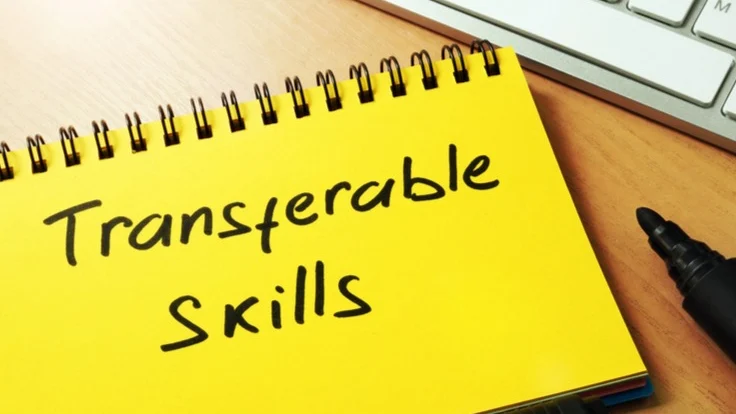As you begin to work on updating or creating your resume, you’ll want to make sure you include a list of transferable skills that market you as a great hire.
Listing transferable skills can help employers understand what you can bring to the role. These are the abilities you’ve gained in one context that can be applied successfully in many different roles or industries.
In this guide, we’re going to cover everything you need to know about this important resume addition, including:
- Definition of transferable skills
- Transferable skill examples
- A transferable skill list you can add to your resume
- How to write your own list of transferable skills
- Tips to help you finish writing your resume quickly
Continue reading this article to get these tips and take advantage of our free AI resume builder that provides instant suggestions of skills to add to your resume that will impress hiring managers.
What Are Transferable Skills?
Transferable skills are aptitudes or abilities that are useful across industries and job titles. They are the set of skills that make you a great employee, no matter where you work.
Transferable skills typically do not belong to any one specific field or role. They can be considered relevant to just about any job you apply for, meaning you should highlight them when transitioning to a new sector.
Not only are transferable skills such as creative thinking, resilience, flexibility, and agility in high demand in 2025, according to the World Economic Forum, but you’ll find your work easier and more enjoyable when you develop these abilities. These are transferable skills that you can bring with you, no matter what role you move into throughout your working career.
Transferable Skill Examples for Your Resume
While not all of your transferable skills will lead to a high-paying role, they can still be stepping stones toward better opportunities. Employers often look for candidates who bring skills like flexibility and problem-solving, regardless of the role.
A great way to highlight your expertise for your prospective employer is to have a separate list titled “Skills” with bullet points listing your most relevant transferable skills.
Bulleted lists are a great way to quickly scan over information on a resume template.
Now that we understand the meaning of transferable skills, let’s get into common examples that you might see on resumes. Here are some of the most common transferable skills:
- Teamwork
- Communication
- Adaptability
- Attention to detail
- Multitasking
- Problem-solving
- Critical thinking
- Computer skills
- Organization
- Active listening
- Interpersonal skills
These types of transferable skills can be assets in any job. Whether you’re an engineer working on a large technical team or a teacher working in a classroom, being a good team player and communicating effectively are crucial to your success in your position.
Those transferable skills could make you an excellent fit in a role, even if you might need a little training on the specifics of the job or a new industry.
Below, review the following transferable skills list of some of the top transferable skills that you can add to your resume.
1. Interpersonal skills
Being able to work well on a team is something we all learn, usually in school, often in sports, and almost always in the workplace.
Knowing how to best interact with other people makes your workday easier and more enjoyable.
Examples of transferable interpersonal skills:
- Cooperation
- Teamwork
- Collaboration
- Team building
- Rapport building
- Delegating
- Supporting teammates
- Sharing and interpreting feelings
- Listening
- Receives feedback well
- Diplomacy
- Tact
- Respectful behaviour
2. Analytical skills
Analytical skills are more sought after than ever before, with analytical thinking included in the top 10 skills on the rise according to the World Economic Forum’s 2025 Future of Jobs Report.
For example, if you’re applying to be a financial analyst, then adding various analytical transferable skills is recommended, as these skills demonstrate your ability to interpret data, solve problems, and make informed decisions.
Examples of transferable analytical skills:
- Problem-solving
- Decision-making
- Data analysis
- Research
- Data science
- Budgeting
- Brainstorming
- Modeling
- Auditing
3. Communication skills
Being able to communicate with your team, bosses, and clients is an essential transferable skill. It doesn’t matter whether you’re working in person or remotely.
You need to have the skills to listen, understand, and reply in different settings.
Some people are better at public speaking, while others are fantastic at written reports and emails. Whatever your communication strengths are, be sure to list them on your resume.
Examples of transferable communication skills:
- Report writing
- Verbal communication
- Oral communication
- Presenting
- Virtual meetings
- Listening
- Negotiations
4. Leadership and management skills
As you might expect, management skills are also tightly linked to interpersonal skills, so you may want to list a skill or two from each category to show the breadth of your expertise.
The position you’re applying to might require you to inspire your colleagues or get them to support your initiatives.
You might need to lead a project or teach more junior members of the team.
In each of these scenarios, you are using leadership, and you can show that you have this skill by listing out the applicable transferable leadership skills from the list below.
Examples of transferable leadership skills:
- Influencing or convincing others
- Strategy
- Teaching
- Coaching
- Mentoring
- Teamwork
- Active listening
- Empathy
- People management
- Change management
- Planning
5. Computer and technical skills
Listing the technical proficiencies you have on your resume helps to signal to your potential future boss that you have the knowledge of online tools and software to work in today’s offices and remote settings.
However, make sure that they are applicable to the new job. Because if you say that you can program in a specific coding language, but the company uses a different language, then that’s not a transferable skill.
However, if you said more generically that you can program or code, then that would apply to the new job.
Here are a few types of computer and technical skills you might list on your resume.
Examples of transferable technical and computer skills:
- Word processing
- Google Suite
- Gmail
- Spreadsheets
- Computer programming
- Graphic design
- Web development
- Digital marketing
- SEO
- Technical writing
- AI skills
If you need some ideas on what transferable skills you can add to your resume, try our free skills generator to make creating your skills section simple.
Where to Put Your Transferable Skills
Transferable skills should appear in both the skills section and the experience section of your resume. In the skills section, list them clearly using terms aligned with the job posting.
In the experience section, highlight each skill by linking it to a specific achievement, ideally accompanied by quantifiable results.
The following are a few examples of how you can add these skills to your resume:
Problem-solving
Reduced processing errors by 30% by redesigning the intake workflow across departments.
This example reflects analytical thinking and initiative skills, showing that the candidate can identify inefficiencies and implement effective solutions.
Communication
Delivered monthly performance briefings to cross-functional teams, contributing to a 15% increase in client retention.
This example highlights the candidate’s ability to translate complex data into clear insights that drive business outcomes.
Project management
Led a six-person team to launch a new product three weeks ahead of schedule while staying under budget.
Mentioning project management skills like this works because they connect soft skills to impact while working.
Why Are Transferable Skills Important?
If you’re changing roles, transferable skills can help you demonstrate to employers that you can adapt quickly, learn on the go, and contribute to a variety of settings.
More specifically, these skills are valuable because they:
- Show adaptability that will make your career changes smoother.
- Improve your employability by showing your potential.
- Demonstrate your career advancement through leadership, communication, or critical thinking.
- Improve your job search success by strengthening your resume and increasing your opportunities for interviews.
- Promote lifelong learning as you take on new challenges in the professional world.
Key Takeaways
Your career change or transferable skills are what can help you land an interview when you don’t have much experience in a new sector.
If you are planning to change careers, remember to:
- Take advantage of your abilities that are not specific to just one sector.
- Highlight quantifiable data to prove you’ve used your skills successfully.
- Study the job description to add skills that are most relevant to the opening.
- Try to add technical skills if you apply for a role that asks you to have knowledge of office software.
Also, remember to take advantage of our tools to create a strong resume. Use our resume editor along with our free resume checker service to help you guarantee that you can apply for a job in a new sector.


